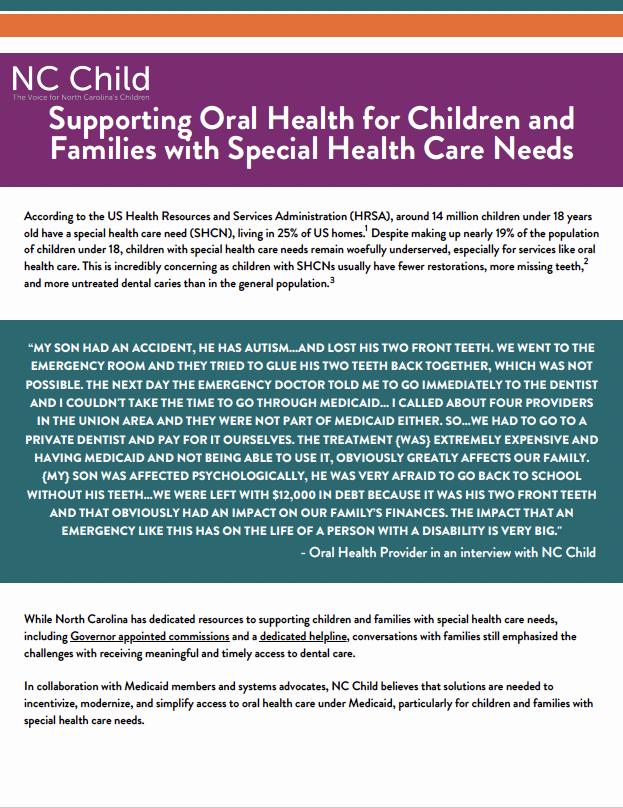According to the US Health Resources and Services Administration (HRSA), around 14 million children under 18 years old have a special health care need (SHCN), living in 25% of US homes(1). Despite making up nearly 19% of the population of children under 18, children with special health care needs remain woefully underserved, especially for services like oral health care. This is incredibly concerning as children with SHCNs usually have fewer restorations, more missing teeth(2), and more untreated dental caries than in the general population(3).
“My son had an accident, he has autism…and lost his two front teeth. We went to the emergency room and they tried to glue his two teeth back together, which was not possible. The next day the emergency doctor told me to go immediately to the dentist and I couldn’t take the time to go through Medicaid… I called about four providers in the Union area and they were not part of Medicaid either. So…we had to go to a private dentist and pay for it ourselves. The treatment {was} extremely expensive and having Medicaid and not being able to use it, obviously greatly affects our family. {My} son was affected psychologically, he was very afraid to go back to school without his teeth…we were left with $12,000 in debt because it was his two front teeth and that obviously had an impact on our family’s finances. The impact that an emergency like this has on the life of a person with a disability is very big.” -Oral Health Provider in an interview with NC Child
While North Carolina has dedicated resources to supporting children and families with special health care needs, including Governor appointed commissions and a dedicated helpline, conversations with families still emphasized the challenges with receiving meaningful and timely access to dental care. In collaboration with Medicaid members and systems advocates, NC Child believes that solutions are needed to incentivize, modernize, and simplify access to oral health care under Medicaid, particularly for children and families with special health care needs.
Key Recommendations
Make it easier for families to get dental care for children with special health care needs.
- Policy Recommendation: Update the state’s Medicaid provider directory every 6 months at a minimum.
- Policy Recommendation: Include an official designation for Medicaid providers that serve children with special health care needs in the state provider directory.
- Policy Recommendation: Provide reimbursement that will appropriately compensate practices that provide flexible, patient-centered care for individuals with special healthcare needs and those who meet agreed upon criteria for complex care needs. This may include use of standardized risk stratification or time-based codes to appropriately account for resource intensity in the provision of oral health services (e.g., behavior management and care coordination codes).
Support workforce development to serve children with special health care needs.
- Policy Recommendation: Require special health care needs practice training as part of mandatory curriculum for all dental providers.
- Policy Recommendation: Develop incentive programs for graduating dental providers who agree to serve this population for designated period of time, including but not limited to loan forgiveness, enhanced rates, and grants to increase innovative ways to provide care for this population.
- Policy Recommendation: Include dental screening and referrals as mandatory screening service under managed care including Standard Plans and Tailored Plans.
Endnotes
1 Health Resources and Services Administration. (2022, June). Children and youth with special heath care needs data brief. Children and Youth with Special Health Care Needs. https://mchb.hrsa.gov/sites/default/files/mchb/programs-impact/nsch-data-brief-children-youth-special-health-care-needs.pdf
2 Anders P.L., Davis E.L. Oral health of patients with intellectual disabilities: A systematic review. Spec. Care Dent. 2010;30:110–117. doi: 10.1111/j.1754-4505.2010.00136.x. https://onlinelibrary.wiley.com/doi/abs/10.1111/j.1754-4505.2010.00136.x
3 Jokić N.I., Majstorović M., Bakarcić D., Katalinić A., Szirovicza L. Dental caries in disabled children. Coll. Antropol. 2007;31:321–324. https://europepmc.org/article/med/17598418

